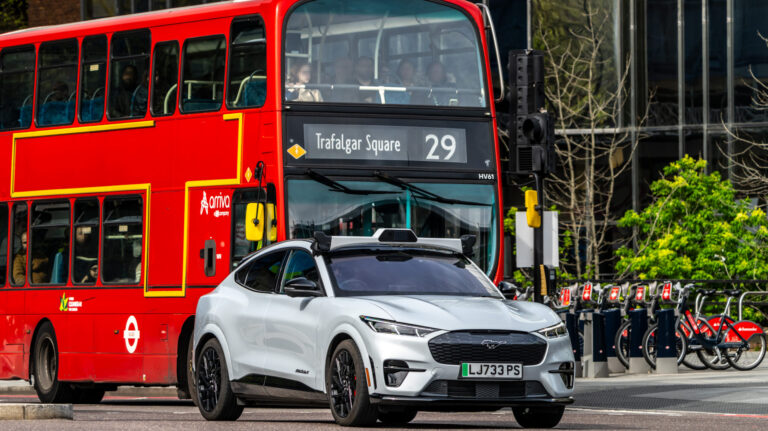UK transport secretary Heidi Alexander has confirmed that the government will fast-track self-driving commercial pilots on England’s roads to spring 2026. Nearly 40,000 jobs could be created, roads could be made safer and billions could be added to the economy by the development of autonomous transportation, UK government says.
Firms will be able to pilot small scale “taxi- and bus-like” services without a safety driver for the first time – which could be available to members of the public to book via an app – before a potential wider rollout when the full Automated Vehicles Act becomes law from the second half of 2027.
Innovation, world-leading regulation and road safety will be at the forefront of the pilots, with self-driving vehicles aiming to reduce human error – which contributes to 88% of all road collisions.
Bringing forward the pilots of self-driving vehicles by a year is designed to help the government deliver the Plan for Change, by creating 38,000 jobs, driving investment to back British engineering and creating an industry worth £42bn (US$57bn) by 2035.
The Society of Motor Manufacturers and Traders (SMMT) states that self-driving vehicles have the potential to deliver annual economic benefits as high as £66bn (US$89bn) and an estimated additional 342,000 jobs by 2040. The technology, thit says, could also save 3,900 lives and prevent 60,000 serious accidents over the next 15 years, while offering a wider array of accessible mobility solutions to disabled and older people.
Alexander said, “The future of transport is arriving. Self-driving cars could bring jobs, investment and the opportunity for the UK to be among the world-leaders in new technology. With road safety at the heart of our pilots and legislation, we continue to take bold steps to create jobs, back British industry and drive innovation to deliver our Plan for Change.”
Safety and accessibility
The Automated Vehicles Act will require self-driving vehicles to achieve a level of safety at least as high as competent and careful human drivers, and they will undergo rigorous safety tests before being allowed on UK roads.
By having faster reaction times than humans and by being trained on large numbers of driving scenarios, including learning from real-world incidents, self-driving vehicles can help reduce deaths and injuries. Unlike human drivers, automated vehicles (AVs) can never get distracted or tired and they won’t drink-drive or speed.
Self-driving vehicles can also improve transportation for millions of people – providing greater choice and flexibility to get around more easily. They could add new public transportation options in rural areas to boost connectivity for local communities, and improve mobility, accessibility and independence for those unable to drive.
The latest measures have been welcomed by the two trade associations that represent companies developing the technology, road safety groups and organizations supporting people with disabilities. The SMMT and techUK, along with RoSPA, RoadSafe, RNIB and Motability Operations, have said that the announcement brings the country a step closer to realizing the road safety and socio-economic benefits promised by self-driving technology.
Mike Hawes, SMMT chief executive, said, “Britain’s self-driving vehicle revolution moves one step closer, with today’s announcement putting the country on track to reap the road safety and socioeconomic benefits this technology can deliver. Pilot rollout of commercial self-driving services from next year will widen public access to mobility, while the consultation will ensure the technology is deployed in a safe and responsible way. These latest measures will help Britain remain a leader in the development and introduction of self-driving vehicles.”
Trials so far
Self-driving trials have already been taking place in the UK since January 2015, with British companies Wayve and Oxa leading the development of the technology. From spring 2026, self-driving cars without a safety driver could be available for people to book via an app for the first time.
The UK is already host to a thriving self-driving sector. Wayve secured an investment of over US$1bn and announced recent partnerships with Nissan and Uber, while Oxa has already supported ‘bus-like’ services in the USA and started rolling out self-driving vehicles at Heathrow Airport to improve baggage handling.
Alex Kendall, co-founder and CEO, Wayve commented, “The UK has been Wayve’s home since 2017 – building this technology here has been an incredible journey, from testing our first prototype in Cambridge to deploying the world’s first end-to-end AI driver on public roads, starting in London and expanding nationwide.
“Accelerating commercial self-driving pilots to 2026 positions the UK as a leading destination for the deployment of L4 self-driving technology. These early pilots will help build public trust and unlock new jobs, services and markets. For Wayve, this means we can prioritize the UK for early deployment and help deliver safer, cleaner mobility to the UK. We’re excited to bring the benefits of L4 autonomous mobility to cities around the UK.”
In related news, autonomous driving technology company WeRide has announced the launch of fully driverless robotaxi trial operations in Abu Dhabi. Starting this quarter, a fleet of WeRide’s robotaxis will be piloted on public roads without a safety driver. Read the full story here


